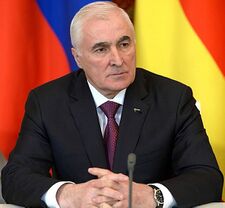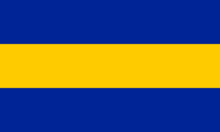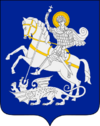Medovia: Difference between revisions
No edit summary |
|||
| Line 59: | Line 59: | ||
==History== | ==History== | ||
===Antiquity=== | |||
The Medovian people are said to have come into existence after the migration of several Indo-European tribes to the Medovian Basin, south of the current day capital of Medovia, Gavarnik. The proto-Medovian language, which at the time was much closer to the Basque language, was spoken by a dominant tribe that had setup trading posts near today's Medovian Coast. The assimilation of the tribes that had come to the basin and coast resulted into the Medovian ethnos and nation. Linguistic analysis shows continued Indo-European influence on the Medovian language to bring it from the proto-Medovian which was not classified as Indo-European to an Indo-European status. Throughout antiquity, much of the Medovian people were politically divided despite having a common heritage, language, and territorial area. Wars between clans and regions were common and the disunity of the early part of Medovia's history gave the nation a great disadvantage. | |||
[[File:Medovian st george.jpg|thumb|left|200px|St. George<br /><small>Patron Saint of Medovia</small>]] | |||
The adoption of Christianity was an important milestone in Medovian history. The Medovian people were quick to adopt the religion which had reached them through missionaries spreading the word of Christ. The adoption of Christianity greatly united the Medovian people culturally and also helped to decrease the amount of divisions that were present in the Medovian homeland. The Medovian Apostolic Church helped unite Medovians culturally what politically was not possible because of bitter rivalries and regional disagreements. The Medovian Apostolic Church remained quite independent throughout the centuries and despite pressures to unite with Orthodox or Catholic branches, the Apostolic Church remained independent and steadfast to a "wholly independent Church, loyal to traditions of Christ". The Church's theology today would be classified as belonging to the [https://en.wikipedia.org/wiki/Oriental_Orthodox_Churches Oriental Orthodox] branch of Churches. Oriental Orthodoxy rejects the Chalcedonian Definition, and instead adopts the miaphysite formula, believing that the human and divine natures of Christ are united. | |||
As commerce and technology improve so did societal and political organization of the Medovians. Much of the inhabited lands by Medovians were located in present day Medovia's Southern portion, especially along the coast where commerce thrived. The major port city of '''Peshkaji''' became the center of Medovian political and cultural life. Peshkaji is located around 100km south of the capital Gavarnik. Yet much into the Middle Ages, the Medovian nation was focused on commerce and political unification as a whole was still lacking; historians describe this era as the "Confederal Era" as small governing cantons comprised of the Medovian homeland, that governed quite independently from each other and the unity among the cantons was very loose and formal. The Confederal Era, however, came to an abrupt end, when invasions and threats from the North disrupted the Medovian nation. | |||
===Unification & Invasions=== | |||
==Geography== | ==Geography== | ||
Revision as of 16:50, 29 March 2020
Republic of Medovia Medovasi Rëspublika (Medovian) | |
|---|---|
| Motto: "Deosez rekin, ćue gaudëk sen marrlisem" "With God, all things are possible" | |
| Anthem: Mil Hameltik! My Homeland! | |
| Capital and largest city | Gavarnik |
| Official languages | Medovian |
| Ethnic groups | 94% Medovian 6% Other |
| Demonym(s) | Medovian |
| Government | Unitary Parliamentary Republic |
| Samel Gorgevem | |
| Hakob Beliśavar | |
| Legislature | Parliament of Medovia |
| Independence | |
| Population | |
• 2019 estimate | 17,450,200 |
| GDP (nominal) | 2019 estimate |
• Total | $83.172 billion |
• Per capita | $15,646 |
| HDI (2019) | 0.825 very high |
| Currency | Deru |
| Driving side | right |
Medovia (Medovian: Medova), officially the Republic of Medovia (Medovian: Medovasi Rëspublika), is a country in Anteria.
History
Antiquity
The Medovian people are said to have come into existence after the migration of several Indo-European tribes to the Medovian Basin, south of the current day capital of Medovia, Gavarnik. The proto-Medovian language, which at the time was much closer to the Basque language, was spoken by a dominant tribe that had setup trading posts near today's Medovian Coast. The assimilation of the tribes that had come to the basin and coast resulted into the Medovian ethnos and nation. Linguistic analysis shows continued Indo-European influence on the Medovian language to bring it from the proto-Medovian which was not classified as Indo-European to an Indo-European status. Throughout antiquity, much of the Medovian people were politically divided despite having a common heritage, language, and territorial area. Wars between clans and regions were common and the disunity of the early part of Medovia's history gave the nation a great disadvantage.
The adoption of Christianity was an important milestone in Medovian history. The Medovian people were quick to adopt the religion which had reached them through missionaries spreading the word of Christ. The adoption of Christianity greatly united the Medovian people culturally and also helped to decrease the amount of divisions that were present in the Medovian homeland. The Medovian Apostolic Church helped unite Medovians culturally what politically was not possible because of bitter rivalries and regional disagreements. The Medovian Apostolic Church remained quite independent throughout the centuries and despite pressures to unite with Orthodox or Catholic branches, the Apostolic Church remained independent and steadfast to a "wholly independent Church, loyal to traditions of Christ". The Church's theology today would be classified as belonging to the Oriental Orthodox branch of Churches. Oriental Orthodoxy rejects the Chalcedonian Definition, and instead adopts the miaphysite formula, believing that the human and divine natures of Christ are united.
As commerce and technology improve so did societal and political organization of the Medovians. Much of the inhabited lands by Medovians were located in present day Medovia's Southern portion, especially along the coast where commerce thrived. The major port city of Peshkaji became the center of Medovian political and cultural life. Peshkaji is located around 100km south of the capital Gavarnik. Yet much into the Middle Ages, the Medovian nation was focused on commerce and political unification as a whole was still lacking; historians describe this era as the "Confederal Era" as small governing cantons comprised of the Medovian homeland, that governed quite independently from each other and the unity among the cantons was very loose and formal. The Confederal Era, however, came to an abrupt end, when invasions and threats from the North disrupted the Medovian nation.
Unification & Invasions
Geography
Politics and Government
Medovia is a parliamentary constitutional republic and sovereign state whose politics operate under a framework laid out in the constitution wherein the president functions as the head of state and the prime minister as the head of government. The sovereignty is vested in the Medovian people and exercised by the Medovian people through their representatives or directly.
The executive power is exercised by the president and prime minister whereby the power of the president is very limited. The Prime Minister is the commander-in-chief of the military and the President is the representative of the unity of the Medovian people. The tenure of the president depends on the confidence of the parliament and is elected for a five-year term by the parliament by a majority of three-fifths of all its members. The prime minister, appointed by the president and approved by the parliament, is authorized to constitute the cabinet. The cabinet is composed primarily of the prime minister inclusively its deputies and ministers.
President
The president of Medovia (Medovian: Medovasi Legëlburu), officially styled President of the Republic of Medovia (Medovian: Medovasi Rëspublikasi Legëlburu) is the head of state and the representative of the unity of the Medovian people.
The president has the power to set the date of the elections for the Parliament as well as referendum, grants pardons and awards and other state awards. In case of incapability to discharge duties of office, the Chairperson of the Parliament assumes the office of acting president until the president resumes duty, or until election of a new president. The Office of the President of Medovia consists of the immediate staff of the president of the country, as well as support staff reporting to the president. The office is seated in the Presidential Office in the capital city Gavarnik.
The president is elected through a secret vote and without debate by the Parliament of Medovia by a majority of three-fifths of all its members and is in every case elected for 5 years. However, the Constitution of Medovia sets a limit to a maximum of two terms in office. The president-elect is required to take an oath of office before the members of the Parliament of Medovia. The President must not belong to any political party.
Prime Minister
The prime minister of Medovia (Medovian: Medovasi Ćjefministër), officially styled Prime Minister of the Republic of Medovia (Medovian: Medovasi Rëspublikasi Ćjefministër), is the head of government of the Republic of Medovia and as well the most powerful and influential person in Medovian politics. The prime minister holds the executive power of the nation, represents the Council of Ministers and chairs its meetings, and also is commander-in-chief of the military.
The prime minister is appointed by the president of Medovia after each general election and must have the confidence of the Parliament of Medovia to stay in office. The Council is responsible for carrying out both foreign and domestic policies. It directs and controls the activities of the ministries and other state organs. The prime minister is elected on the basis of universal suffrage, through a secret ballot, for a four-year term. The Constitution of Medovia sets no limit as to office terms of the prime minister.
Parliament
The Parliament of Medovia (Medovian: Medovasi Legebilcarag) is the unicameral representative body of the citizens of the Republic of Medovia; it is Medovia's legislature. The Parliament is composed of not less than 150 members elected to a four-year term on the basis of direct, universal, periodic and equal suffrage by secret ballot. The Parliament is presided over by a Speaker of the Parliament, who is assisted by at least one deputy speaker. The electoral system is based on party-list proportional representation.
Formation of Government requires at least 76 seats to be secured by party outright or via a ruling coalition. After an election, the President officially tasks the leader of the political party with most votes to form a ruling coalition for government.
The current government ruling coalition and opposition:
| Parties | Status | Total MPs |
|---|---|---|
| Medovian National Front, Patriotic Union | Government Ruling Coalition | 81/150 |
| Democratic Alliance, Medovian Socialist Movement, Centre Way | In Opposition | 69/150 |
Political Parties
| Name | Abbr. | Founded | Leader | Ideology | MPs |
|---|---|---|---|---|---|
| Medovian National Front Medovas Nacionlik Fiśdar |
MNF | 15 August 1985 | Hakob Beliśavar | Centre-Right to Right , National Conservatism, Social Conservatism, Economic Liberalism | 70 / 150
|
| Democratic Alliance Demokratlik Itunśat |
DA | 2 July 1985 | Simon Pagosov | Centre to Centre-Left, Liberalism, Social Liberalism | 48 / 150
|
| Medovian Socialist Movement Medovas Socialisnik Efmarźa |
MSM | 23 September 1985 | Meriam Akobeś | Centre-Left to Left, Social Democracy, Progressivism, Social Ecology | 14 / 150
|
| Centre Way Centrum Modu |
CW | 1 March 1993 | Madir Lestrica | Centre, Centrism, Economic Liberalism, | 7 / 150
|
| Patriotic Union Hameltikeś Bëtërsunar |
PU | 20 April 1988 | Andras Metusalem | Far-Right, Ethnic Nationalism, Social Conservatism, Interventionism | 11 / 140
|
Military
Foreign Relations
Symbols & Anthem
National Flag
The National Flag of Medovia is consists of two primary colors and has a ratio of 3:5 (1.667). The blue color on the top and bottom symbolizes the river of life given to the Medovian people and the yellow strip through the middle symbolizes the light of God and Jesus Christ which has illuminated the Medovian people throughout their history and a testament to the Christian heritage of Medovia.
National Coat of Arms
The National Coat of Arms of Medovia consists of the patron saint of Medovia, St. George, in which he is defeating a dragon. The gold plates on the horse along with the gold colored halo above his head signify St. George's holiness. The blue color background is the same shade of blue used on the Medovian flag which symbolizes the river of life. St. George plays an important role as a protector of the Medovian nation and state; he is one of the most venerated Saints in the country.
National Anthem
Economy
Demographics
Education
Religion
Culture
Medovian Language
The Medovian language is an Indo-European language which has older influences from Basque language, but also Indo-European Germanic and Latin influences that continuously influenced the language afterwards. Many linguists classify Medovian as an "Indo-European cousin" of the Basque language.
Alphabet
| A a | B b | C c | Ćć | D d | E e | Ë ë | F f | G g | H h | I i | J j | K k | L l |
| /ɑ/ | /b/ | /ts/ | /tʃ/ | /d/ | /ɛ/ | /ə/ | /f/ | /ɡ/ | /h/ | /i/ | /j/ | /k/ | /l/ |
| M m | N n | O o | P p | R r | Rr rr | S s | Ś ś | T t | U u | V v | X x | Z z | Ź ź |
| /m/ | /n/ | /ɔ/ | /p/ | /r/ | /ʁ/ | /s/ | /ʃ/ | /t/ | /u/ | /v/ | /dz/ | /z/ | /ʒ/ |
Common Combinations
| dź | /dʒ/ |
| nj | /ɲ/ |
Noun Cases
Geson - Man
| Indefinite singular | Indefinite plural | Definite singular | Definite plural | |
|---|---|---|---|---|
| Nominative | Geson | Gesonëk | Gesona | Gesonarak |
| Accusative | Geson | Gesonëk | Gesona | Gesonarak |
| Genitive | Gesoni | Gesonëś | Gesonari | Gesonen |
| Dative | Gesonek | Gesonëk | Gesonak | Gesonevi |
| Ablative | Gesonez | Gesonëz | Gesonarez | Gesonareź |
If noun ends in a vowel (a, e, ë, i, o, u). The endings are changed respectively:
Emake - Woman
| Indefinite singular | Indefinite plural | Definite singular | Definite plural | |
|---|---|---|---|---|
| Nominative | Emake | Emakek | Emaka | Emakarak |
| Accusative | Emake | Emakek | Emaka | Emakarak |
| Genitive | Emakesi | Emakeś | Emakari | Emaken |
| Dative | Emakesek | Emakerek | Emakak | Emakevi |
| Ablative | Emakez | Emakez | Emakarez | Emakareź |
Verb Cases
Common Articles






